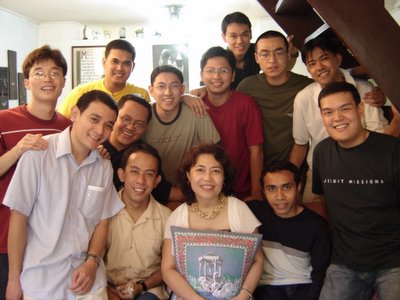
27 February 2006: Monday of the 8th Week in Ordinary Time
Mark 10, 17-27: The Rich Young Man
It is important to see how the young man approached Jesus. He came running. He threw himself at his feet and sincerely asked Jesus what he must do to attain eternal life. And Jesus directed the man’s attention to the commandments that contain the norm of conduct. The young man then answered that he had followed the commandments.
We do find ourselves much similar like the young man. When we attend retreats and prayer meetings, or when our prayers are answered and feel God’s blessings on us, our emotions overtake us. We literally throw ourselves at the Lord’s feet. And then we shower the Lord with promises of being faithful to him. And most of us have succeeded fairly well in following the Lord’s commandments. Indeed, the Lord looks at us the way He looked at the young man: with love and personal fascination.
And then, He gently challenged him, “You are lacking in one thing. Go, sell what you have, give to the poor, and come follow me.” At that the young man went away sad for he had many possessions.”
Jesus has a way of looking at people. The eyes of Christ penetrate our hearts that he sees what we lack. The second reading notes that “everything is naked and exposed to the eyes of God.” Jesus knows us totally that He can tell us what are the things that would prevent us from giving ourselves selflessly and perfectly to Him. His first great commandment is to worship the Lord with all our hearts and there are no exceptions. We are asked to love God in all aspects of our lives. And thus, Jesus knows our obstacles to following God with all of our hearts.
We can be “rich” in a lot of things and not just wealth and material possessions. We can be attached to our reputation, our family, our intelligence, and our friends. To be personally attached means that we love them possessively and that these objects and relationships do not lead us to love God. Jesus’ challenge is to let go of all these selfish attachments so that we can love God with all of our hearts.
I remember the advertisement of Nestea in which different people, scorching from the summer sun, would fall into the swimming pool with a thirst-quenching “ahhh” on their faces. This image describes what it means to let go of all our attachments. We are invited to fall into the arms of Jesus in the same way. The Gospel tells us that we cannot fall freely into the arms of Jesus if we hold on to our wealth, family, reputation and friends. Sometimes we have to severe precious roots that do not help us to praise and worship God.
But letting go of all our selfish attachments requires a decision. And decisions do not come easily. We pray. We struggle. We weep. We go back and forth. We weigh things. To surrender is indeed difficult and often impossible to accomplish. However, Jesus assures us that “nothing is impossible with God.” And thus our relinquishment is a release with hope. In the first reading, the author of Wisdom says that after his choice over “scepter and throne, priceless gems and gold,” all good things came to him.” We are confident that if we fall, we will fall in the arms of God.
* This is Neo Saicon SJ. I use his nice photographs for this blog. Thanks Neo!
** In the icon "The Narrow Gate" is a link to the books I use for these homilies. Click on "My Starting Place" for the references.














